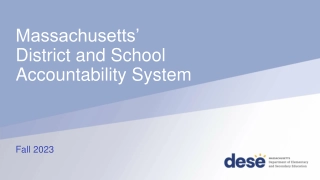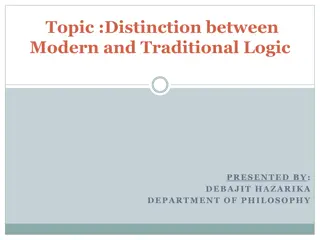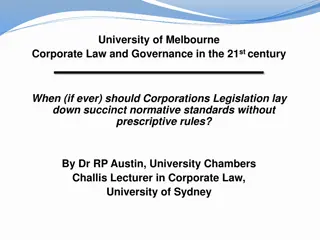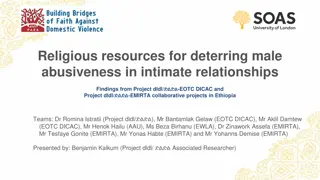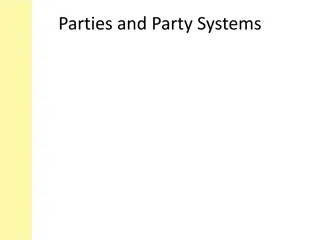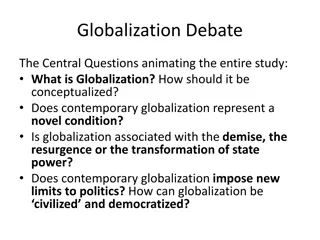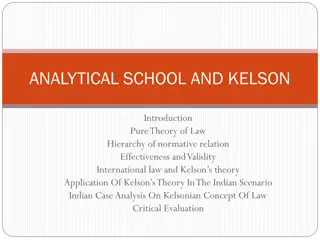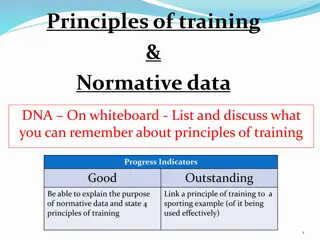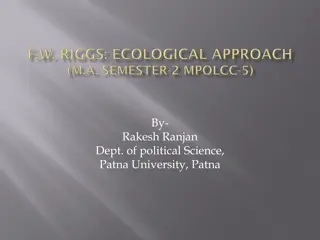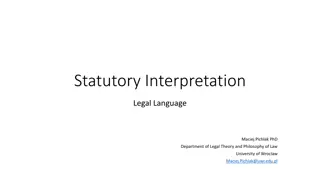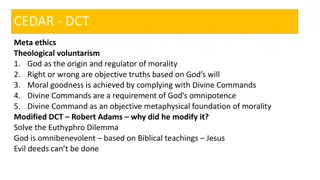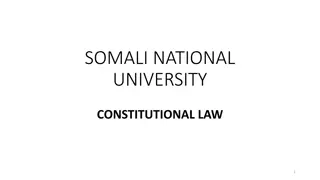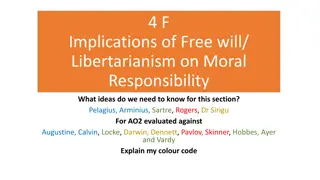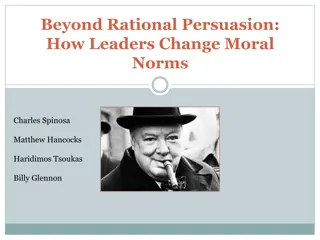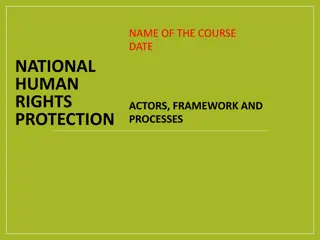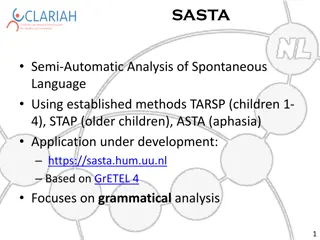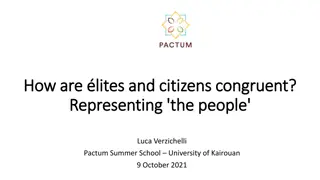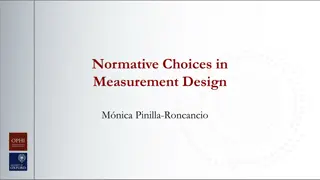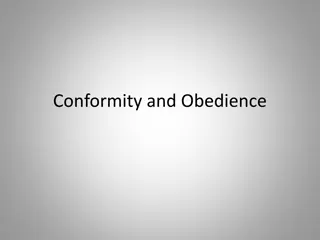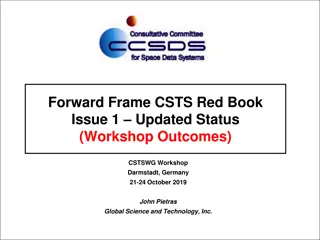Massachusetts District and School Accountability System Fall 2023
The Massachusetts District and School Accountability System for Fall 2023 includes various components such as Accountability Indicators, Normative Component, Criterion-Referenced Component, Assessment Participation, Categorization of Schools and Districts, and Reporting. It emphasizes measuring the
2 views • 32 slides
Exploring Ethics: Branches, Theories, and Moral Dilemmas
Ethics delve into Meta Ethics, Normative Ethics, and Applied Ethics to understand moral concepts and decision-making. The discourse covers various ethical theories like Absolutism, Relativism, Subjectivism, and explores the difference between Teleological and Deontological decision-making. Thought-p
5 views • 14 slides
Topic : Distinction between Modern and Traditional Logic.
Logic, as a normative study, focuses on distinguishing correct reasoning from incorrect. Traditional logic, based on Aristotle's work, emphasized syllogistic reasoning, while modern logic, pioneered by figures like Leibnitz and Russell, employs mathematical methods and symbolic logic for a more adva
0 views • 10 slides
Contrasting Concepts in Political Science: Normative vs Descriptive Approaches
Normative and descriptive concepts in Political Science explore contrasting viewpoints on how things should be versus how they actually are. While normative claims focus on value judgments, descriptive claims deal with facts. These concepts complement each other by providing both theoretical and pra
0 views • 10 slides
Understanding Irregular Immigration Beyond Stereotypes
The issue of irregular immigration has gained prominence in recent decades, particularly in the context of increased immigration policies and border closures. While there is a general trend towards more restrictions on immigration in Europe and the Global North, there remains a lack of clarity on wh
0 views • 23 slides
Contemporary Approaches to Corporate Legislation Standards
Exploring the necessity of implementing succinct normative standards without prescriptive rules in corporate legislation, this article by Dr. RP Austin from the University of Sydney delves into various aspects of statutory corporate law, such as equality of opportunity, financial services licensee b
0 views • 22 slides
Understanding the Positive/Normative Distinction in Economics
Textbooks in economics often teach the Positive/Normative Distinction, where Positive Economics deals with facts and Normative Economics focuses on values and opinions. This distinction is a point of debate among scholars, with some arguing that values are intrinsic to all analysis. The debate also
0 views • 28 slides
Religious Resources for Deterrence of Male Abusiveness in Intimate Relationships
This research project, conducted in collaboration with various organizations and experts, delves into the role of religion in deterring male abusiveness within intimate relationships. Findings suggest that religion can serve as a deterrent at both individual and normative levels, emphasizing faith-b
0 views • 9 slides
Normative Accents in English: RP and GenAm Overview
Normative English accents, Received Pronunciation (RP) and General American (GenAm), serve as reference points for English learners and speakers globally. RP is associated with the British elite and institutions, while GenAm represents a regionless form of American pronunciation. Both accents, spoke
0 views • 22 slides
Women's Empowerment and Sustainable Development Initiatives
Strengthening normative, legal, and policy frameworks is vital in advancing gender equality. Efforts such as the National Strategy for Gender Equality, tackling violence against women, and mainstreaming gender perspectives in education contribute to empowering women. Initiatives to foster enabling e
0 views • 8 slides
Understanding Party Systems in Comparative Politics
Parties in comparative politics play a crucial role in deepening democracy, connecting political society with the State, and maintaining accountability. The definition of a party can be categorized based on normative, motivational behavior, and operational perspectives. The development of party syst
0 views • 16 slides
The Globalization Debate: Understanding Different Perspectives
The globalization debate revolves around key questions such as the nature of globalization, its impact on state power, and the need for democratization. Three main schools of thought - Hyperglobalizers, Sceptics and Transformationalists - offer differing perspectives on the concept. Hyperglobalizers
0 views • 19 slides
Enhancing Adolescent Sexual and Reproductive Health Rights in Zimbabwe: 2021-2022 Campaign
This campaign focuses on improving access to sexual and reproductive health services for adolescents in Zimbabwe through policy analysis, normative frameworks alignment, and targeted actions such as provision of menstrual ware and comprehensive sexuality education. Emphasis is placed on fulfilling S
0 views • 13 slides
Analytical School and Kelson's Pure Theory of Law: A Critical Analysis
Kelsen's Pure Theory of Law emphasizes the hierarchy of norms and the normative character of law, free from extra-legal elements. This theory, in contrast to other perspectives like Hart's, aims to maintain the purity of law by isolating strictly legal components. Kelsen's focus on normative behavio
1 views • 15 slides
Principles of Training and Normative Data in Fitness
Explore the essential principles of training, progress indicators, and the purpose of normative data in fitness assessments. Learn how normative data from a general population can help gauge your own fitness levels. Discover fitness tests like the Sit-Up Test and Press-Up Test and how you can use no
0 views • 17 slides
Elements of Social Action: Understanding Human Behavior in Society
Social action plays a vital role in analyzing human behavior within a society. Max Weber's concept emphasizes how actions influence and are influenced by others, holding subjective meanings. Talcott Parsons outlined five components: actor, objective, social situation, normative orientation, and ener
0 views • 9 slides
The Ecological Approach in Comparative Public Administration
Fred W. Riggs, a proponent of the Ecological Approach in Public Administration, emphasized the importance of understanding the interaction between administrative systems and their external surroundings. He introduced the Fused-Prismatic-Diffracted Model to explore the unique contexts of developing c
0 views • 21 slides
Understanding Ethics: Foundations and Principles
Ethics, a cornerstone of human behavior, encompasses descriptive, normative, and meta ethical aspects. It delves into the nature of ethics, its definition, and the essence of ethical judgment. Ethics evaluates conduct against moral ideals, aiming to guide moral judgments and actions with regard to t
0 views • 6 slides
Challenges in Teacher Candidate Dress Code Interpretation
Exploring the complex issues surrounding teacher candidate dress codes, this presentation delves into language sexualization, inclusivity for non-normative students, and cultural considerations. It highlights the expectations of professionalism while addressing the impact of traditional gender norms
0 views • 13 slides
Understanding Statutory Interpretation in Legal Context
Explore the intricacies of statutory interpretation, linguistic and non-linguistic methods, and types of interpretation in legal contexts. Uncover the significance of legal reasoning, historical perspectives, and comparisons between Anglo-Saxon and Continental legal cultures. Delve into the complexi
1 views • 17 slides
Exploring Meta-Ethics: Understanding Ethical Principles
Meta-ethics delves into the nature and validity of ethical statements, examining the meaning of right and wrong and the basis for moral claims. It explores distinctions between descriptive and normative ethics, cognitive and non-cognitive perspectives, and various ethical approaches such as naturali
0 views • 34 slides
Addressing Disrespect and Abuse in Maternity Care
Maternity care workers face challenges related to disrespect and abuse during facility-based childbirth worldwide. Issues such as physical abuse, non-consented care, non-confidential care, non-dignified care, and discrimination have been documented in various countries. This global problem lacks nor
1 views • 19 slides
Normative Standards for Public Participation in Constitutional Making Process
This article delves into the importance of public participation in the constitution-making process, highlighting effective methods such as consultation, inclusiveness, and credibility of reviewing bodies. It emphasizes the shift towards participatory constitution-making and the necessity of involvin
0 views • 32 slides
Moral Responsibility and Free Will Implications in a Contemporary Context
This text delves into the implications of free will and libertarianism on moral responsibility, examining the ideas of various philosophers and thinkers such as Pelagius, Arminius, Sartre, and more. It explores the concepts of moral agency, determinism, normative ethics, religious beliefs, and the c
5 views • 12 slides
Addressing Child Marriages in Lesotho: Analysis, Frameworks, and Laws
This report delves into the issue of child marriages in Lesotho, covering situation analysis, key facts, normative frameworks, and laws in the country. It addresses the minimum legal age of consent to marriage, societal attitudes, and relevant international treaties. The current situation in Lesotho
4 views • 12 slides
Corporate Evaluation of UN Women's Contribution to Humanitarian Action
The Independent Evaluation and Audit Services conducted an evaluation of UN Women's work in humanitarian action from 2014-2018, assessing its relevance, effectiveness, and sustainability. The evaluation emphasized the need for stronger links between UN Women's global normative work and humanitarian
0 views • 9 slides
Leadership and Moral Norm Change: Beyond Rational Persuasion
This study explores how formal leaders can change moral norms through morally risky actions, with the participation of followers. It delves into the theory of moral entrepreneurship, practice-based leadership, and institutionalism to understand how leaders embedded in practices bring about radical n
0 views • 5 slides
Understanding National Human Rights Protection Systems
Explore the essential elements of national human rights protection systems including actors, frameworks, and processes. Learn about the foundational role of the state, legal frameworks, institutions, and the involvement of non-state actors in upholding human rights. Reflect on the importance of dome
0 views • 35 slides
Metaphysics of the Ecological Self and Monism in Philosophy
The discussion explores the concept of the ecological self in deep ecology and the interplay with contemporary analytic philosophies like monism. It proposes a moderate view that acknowledges internal dependence relations between humans and the environment, grounding normative claims about human-env
2 views • 29 slides
SASTA: Semi-Automatic Analysis of Spontaneous Language
Application development for linguistic analysis using established methods like TARSP, STAP, and ASTA. Focuses on grammatical analysis, comparing results to normative figures. Shows promise in linguistic assessment, with potential societal impact.
0 views • 4 slides
Alignment of EDGEAPP and ETSI MEC for Edge Computing Standards
At a recent joint workshop, 3GPP and ETSI MEC discussed aligning standards to prevent duplication of work and enable interoperability. The collaboration aims to harmonize API definitions, reuse existing specifications, and prioritize normative work for seamless integration. The ultimate goal is to s
0 views • 6 slides
Ethics Training for In-Home Service Providers in Indiana
This training module focuses on ethical considerations for in-home service providers in Indiana, specifically in the context of child welfare services. It includes interactive activities and discussions on agency values, metaethics, and normative ethics theories to guide decision-making in ethical d
0 views • 42 slides
Understanding the Congruence between Elites and Citizens in Representation
The relationship between elites and citizens in representative democracy is explored, tracing historical antecedents, the marriage between representation and democracy, modern representation models, and the roles of representatives. Key themes include responsiveness, responsibility, formalistic, des
0 views • 9 slides
Normative Defeaters: A Study on Legal Rules and Exceptions
Exploring the concept of normative defeaters in legal theory, this study delves into the defeasibility and generality of legal rules, using the example of United States v. Kirby to illustrate how sensible construction prevails over literal interpretation. The discussion also touches on generic cases
0 views • 42 slides
Choices in Measurement Design and National Poverty Assessment
This content discusses normative choices in measurement design, normative reasoning, relevance, usability, essential choices for creating an Alternative Poverty Measure (AF Measure), alongside measurement design considerations, and a purpose statement for a National MPI. It emphasizes the importance
0 views • 33 slides
Normative Theories of Social and Fiscal Justice in Historical Perspective
The lecture explores normative theories of social and fiscal justice, focusing on social objective functions, utilitarianism, maximin principle, and general social welfare functions. It discusses the challenges of determining social objectives in a world with conflicting values and beliefs, emphasiz
0 views • 24 slides
Understanding Communicative Acts on Social Networking Sites
Exploring the taxonomy of communicative acts on social networking sites, this work delves into the impact of design features that influence speech acts, commitment, and normative pressures online. By analyzing common families of communicative acts on SNSs, the research sheds light on how these platf
0 views • 29 slides
Understanding Conformity and Obedience in Social Psychology
Conformity and obedience are key concepts in social psychology. Conformity involves changing perceptions or behavior to fit group norms, influenced by factors like informational and normative influences. Sherif's Autokinetic Effect Experiment demonstrated how individuals conform in ambiguous situati
0 views • 25 slides
Update on CSTS Red Book Issue 1 at CSTSWG Workshop in Darmstadt
Final resolutions for 9 RIDs have been accepted and included in the book, with ongoing issues related to ESA RID FF-5 and the CCSDS SLS Coding and Synchronization WG. Additional changes since the Spring meeting include normative specifications, data transfer mode procedures, and resource sharing in
0 views • 12 slides
Hope Amid Crisis: Normative Ambiguity, the Middle Class, and Investment Fraud in 2000s Venezuela
The study delves into the impact of Stanford Financial Group's investment scheme in Venezuela between 1986-2009, particularly on the middle-class Venezuelans. It explores how normative ambiguity affected the financial decisions of middle-class individuals, highlighting the interplay between futurity
0 views • 10 slides
